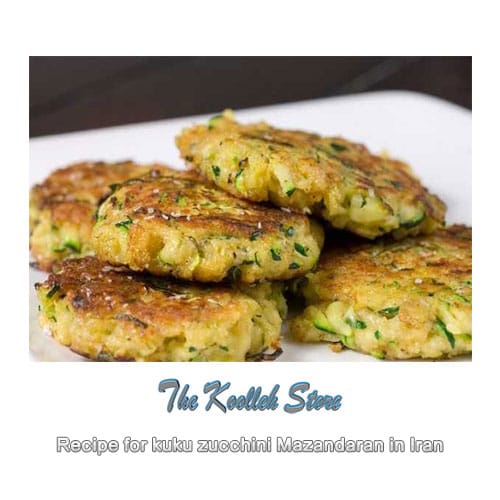Recipe for kuku zucchini Mazandaran in Iran

This delicious and fragrant food called kuku zucchini is a local food in Mazandaran, Iran, which is cooked as follows, and follow the cooking article of Koolleh magazine in the continuation of this article.
INGREDIENTS :
- Zucchini = 2 pics
- Cooked potatoes = 2 pics
- Chicken eggs = 2 pics
- Chopped onion = 4 stems
- Chopped dill = 50 g
- Yogurt = 1/2 cup
- Sour lemon = 1 pics
- Flour = 2 soups pons
- Baking powder = 1/2 teaspoon
- Salt and pepper = the amount needed
INSTRUCTION :
Grate the potatoes and zucchini and add the flour, chicken eggs, baking powder and salt.
Add half of the onion and dill to the ingredients and pour the kuku yeast with a spoon in a pan in which the oil has already been heated and fry the kuku.
To make the sauce, mix the yogurt and dill with the onion, lemon, salt and pepper and serve with fried kuku.
The nutritional importance of zucchini
The total energy of this food is 1300 kcal and it is suitable for people who are on a diet.
Zucchini is rich in vitamin A and in addition it has many vitamins that are useful for heart disease.
Eating 150 grams of zucchini a day meets the body’s need for fiber. It has a laxative effect and relieves constipation and indigestion
Zucchini lowers fever and is a good food for hot-tempered and bilious people. Zucchini is hematopoietic and chemically alkalizes the body. Contains calcium and phosphorus, magnesium and iron, in addition to these properties, prevents skin aging and is rich in antioxidants.
Zucchini is diuretic, softens the chest and relieves cough, and is useful for treating colic. It activates the brain and strengthens memory and rejuvenates the body physically and mentally.
You will have a good night’s sleep after eating zucchini, because it is useful for treating sleep deprivation. Because it is easy to cook, it is good for weak stomachs.
Zucchini is useful for children and those who have an infectious disease and are recovering. It is also very useful in preventing lung cancer and eliminating prostate inflammation in people over 40 years old.

